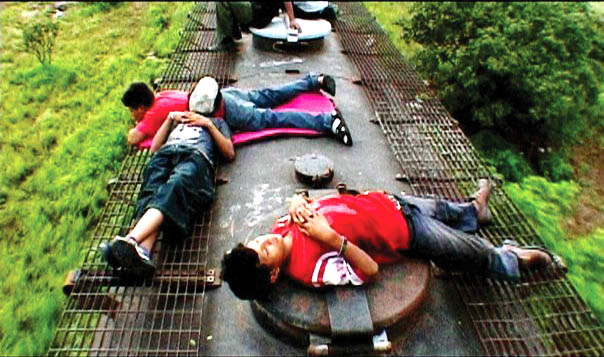Unaccompanied minors
Children resting on top of a train during their journey to America.
How do we know when enough is enough? Enough name calling, finger pointing and ignorance. Its time to shed light on one of the most important, yet little talked about issues- unaccompanied minors. Popularly known as “illegal aliens” seldom do these children come up in the immigration discussion because until very recently they have been coming to our country in relatively small numbers in comparison to those of 2014. Until this year, the average number of children arriving on the U.S. border from countries such as El Salvador, Nicaragua, and Honduras have been around 2,642. This year, alone from these countries combined, a stunning 50,303 children have been apprehended by border patrol; based on the statistics provided on the U.S. Customs and Border Protection website. These numbers beg the question, where are these children now? The answer: in various detention centers throughout the Southwest or deported back to their home countries. Many of these centers provide less than humane conditions, known for being over crowded and unsanitary, (according to Molly Hennessy-Fiske and Cindy Carcamo of the Los Angeles Times). Very simply stated: we aren’t equipped to handle this massive wave of people. Thus, leaving our detention centers overwhelmed and unfortunately this broken system is leaving room for far too many errors. These harsh conditions in which these children find themselves in may surpass those of which they had escaped.
A part of celebrating Hispanic Heritage month at HCC, there was a showing of the film ‘Which Way Home.’ This film followed a group of boys who had left their homes in search of a better life in the United States. The journey is generally long and dangerous for any one, more so for women and children. In the film, they portray the two most popular routes, by train or by smuggler. The boys were taking the train having to stand by and wait for the right train to come by, as they would travel from city to city. This train is more popularly known as “La Bestia” or “The Beast.” On several occasions throughout the film, the boys were recounting others who had fallen off the train and been mutilated by getting caught under the train, which happen frequently considering the sharp turns and lack of stability the train had. Fortunately there is an organization known as Grupos Beta that provides information, medical assistance and protection for the migrants traveling through Mexico. It’s through Grupos Beta that the boys learn about the dangers that smugglers present; dangers such as rape, their smuggler being under the influence of drugs or alcohol just to name a few.
I know of a young woman who was smuggled into the United States whom has since become a citizen, but I know little of her journey. She is like these boys and thousands of others that need their story to be heard, their faces to be seen.
These boys are humans who are searching from a better life. This story is no different from that of our founding fathers, many of our families, even for some of us who have immigrated to the U.S.
While speaking to some peers outside of the Ybor Room where the movie was showing, Adrian Hernandez shared his thoughts with me, “I like that the movie is being played to show people that these are children. They don’t understand that it’s to better their lives. To see the overcome their hardships and get an opportunity.” These people are more than just “Dirty Mexicans, Wet-backs, Illegals or Narcos” they have names Kevin, Jose, Olga and Freddy. They all were in the film and all are just as human as any American and deserve to be treated as such.

Alexandra Posada is a lifelong resident of Tampa, Fl and a proud “Tampanian.” Coming from Cuban and Puerto Rican decent she’s very passionate...

